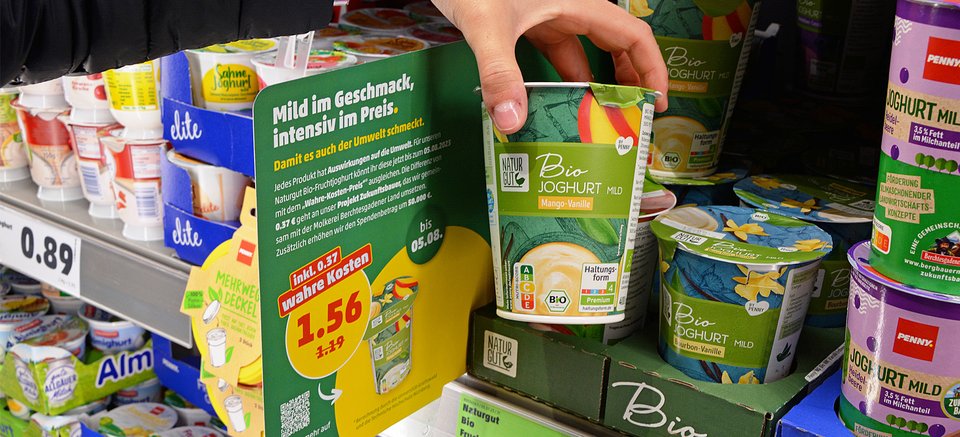
What would food have to cost if its environmental impact along the supply chain was taken into account in the retail price? Answers to this question can be found in a pioneering study that was presented as part of the "True Costs" campaign week (31 July to 5 August).
Every form of production and consumption has an impact on the environment. These currently invisible environmental impact costs - known as true costs - are inevitably incurred along the supply chain, but are not reflected in the sales price of products, services and food, or only in part. Whether, when, how, where and by whom these are offset is not transparent. PENNY, together with the Technical University of Nuremberg and the University of Greifswald, wants to create the basis for a broader discussion on food prices with a Europe-wide pioneering week of action on the "true costs".
Showing options for action
PENNY also wants to use scientific calculations to show customers clear options for action. From 31 July to 5 August, all 2,150 PENNY stores demanded the calculated "true costs" as the retail price for nine selected products. PENNY donated the difference between the current market price and the True Cost price. For selected conventionally and organically produced own-brand products as well as a vegan food, the scientists included the impact of soil, climate, water and health factors on the retail price via the supply chains in the True Costs. Based on the calculations, the team led by Professor Tobias Gaugler and Dr Amelie Michalke came to the conclusion that the true costs are included in the retail price of conventional, organically produced and vegan foods in different proportions. The organic foods surveyed have an average environmental impact cost of €1.15, the conventional foods an average of €1.57 and the vegan Food For Future schnitzel 14 cents(www.penny.de/wahrekosten and www.wahre-preise.de). Back in September 2020, PENNY presented the True Costs to the general public in a pioneering and eye-catching way as part of the opening of the Sustainability Experience Market in Berlin.
Unique throughout Europe
"We recognise that many of our customers are suffering from the persistently high food prices. Nevertheless, we have to face up to the uncomfortable message that the prices of our food along the supply chain do not reflect the environmental impact costs. We want to raise awareness of this with the national True Cost campaign. We also want to work with the Technical University of Nuremberg and the University of Greifswald to identify solutions. To this end, we are providing the scientists with comprehensive data material. There has never been a comparably broad approach anywhere in Europe before. The scientific teams and PENNY are doing real groundwork," says Stefan Görgens, COO PENNY.
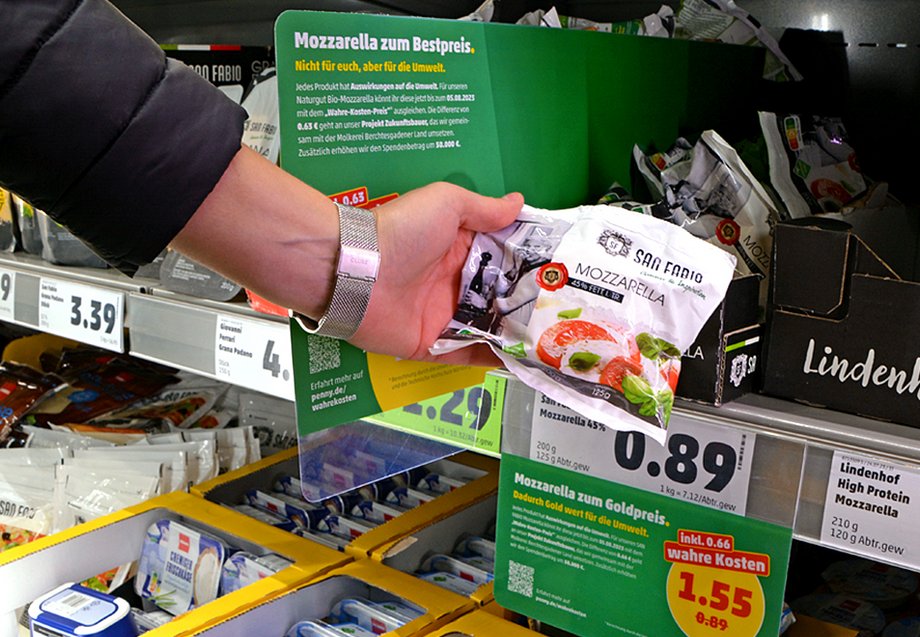
Reducing environmental impact costs
PENNY fundamentally recognises the need to further intensify efforts to make food more sustainable in order to reduce environmental impact costs. A key challenge here is that everyone must continue to be able to afford high-quality food. This requires a broader social discussion, which PENNY, as a single company in competition, cannot initiate alone.
Prof Tobias Gaugler from Nuremberg Institute of Technology says: "We receive comprehensive data about the campaign week, but also about comparison weeks and socio-demographic information. We can certainly gain valuable insights into purchasing behaviour and acceptance of the topic. This can then be used to derive recommendations for action for the various players, above all to design meaningful political measures that contribute to a sustainable transformation of the food sector for consumers and producers."
"It is not a question of introducing the true costs directly for all foods. The comprehensive scientific basis for this is lacking, as are answers to key questions of social justice. We are hoping for a strong impetus so that we can discuss and consider food prices in a different and more (polluter) just way," adds Dr Amelie Michalke, sustainability scientist at the University of Greifswald.
Additional campaign income and an additional 50,000 euros for the Future Builder
PENNY is donating the additional revenue - i.e. the difference between the sales price and the True Cost price - to the Future Builder. This is a joint project between PENNY, the Berchtesgadener Land dairy, farmers and customers with the aim of contributing to climate protection and the preservation of family-run farms in the Alpine region.
Climate: All climate-damaging emissions from agriculture are included here. These are, for example, methane produced by cattle during digestion or carbon dioxide produced during the use of diesel-powered tractors.
Water: All pollutants that have a negative impact on the quality of groundwater or other water sources and reservoirs are described here. For example, nitrogen from fertilisers that upset the nutrient balance of the water. As a result, algae and aquatic plants multiply excessively and deprive other plants or organisms of the basis of life (oxygen and light) - so-called eutrophication. But the consequences of pesticides entering the water, for example, are also measured under the water component.
Soil: One example is the use of natural land for agricultural production: for the production of plants for human or animal (feed) use, for example, the natural characteristics of land are changed so that it can be used as arable land.
Health: Not only the consumption, but also the production of food has an impact on human health. For example, the use of pesticides releases toxic substances that can lead to (carcinogenic or non-carcinogenic) health problems, especially for farmers who come into contact with them. For example, the increased production of particulate matter - mainly due to ammonia, which occurs during animal husbandry or the use of liquid manure - also has a negative impact on the human respiratory tract.
In contrast to current food prices, the "true costs" of food are characterised by the fact that they also include environmental and social follow-up costs that arise during the production of food along the supply chain . These consequential costs are also referred to as "negative externalities". They are caused by all food producers, but are currently borne - indirectly - by society as a whole. For example, consumers pay for greenhouse gas emissions with climate change and its effects; or they pay with the water bill for the treatment of drinking water that is contaminated due to fertilisers.
True cost accounting not only includes the direct production costs in the price of a food product, but also converts its impact on ecological or social systems into monetary units. Accounting for food prices using this scientific method shows consumers the actual price they are currently paying for their food - not at the supermarket checkout, but elsewhere - and helps them to understand which products have a long-term impact on the health of the planet - and their wallets at the same time.

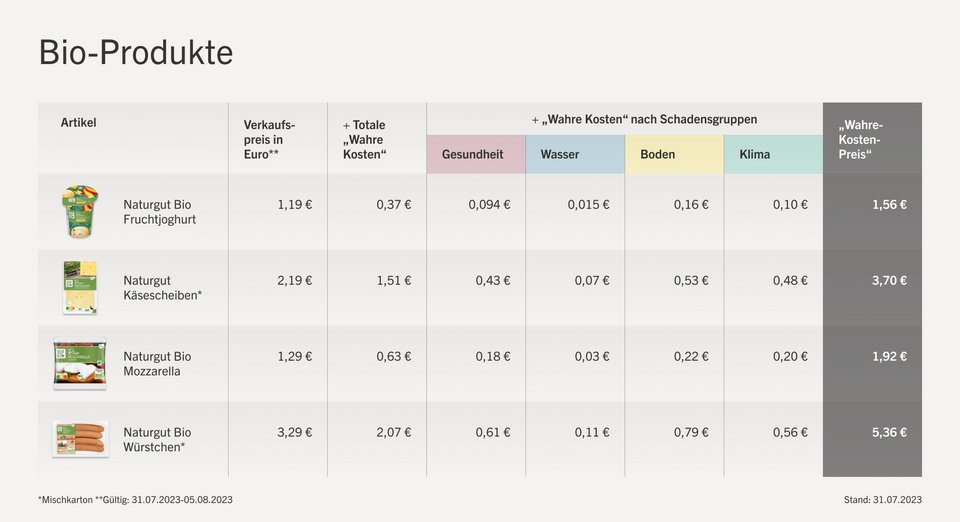
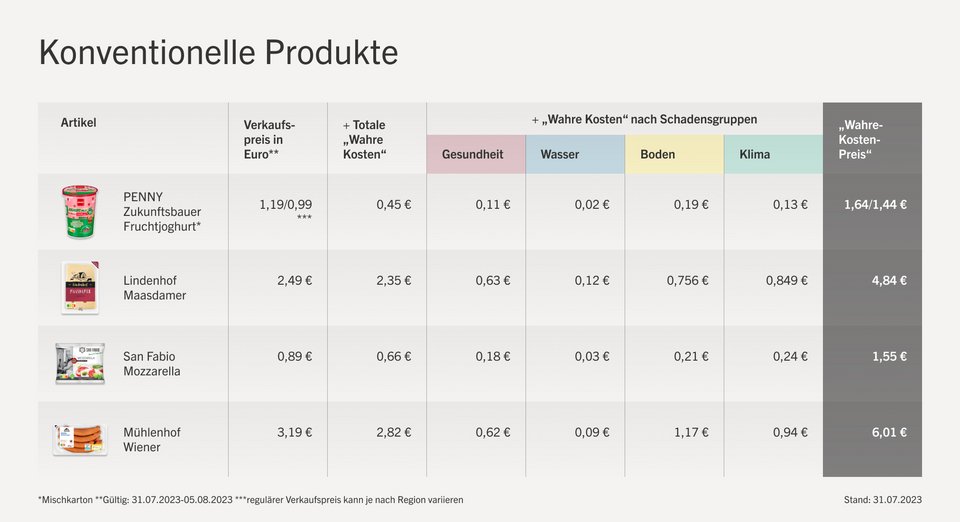
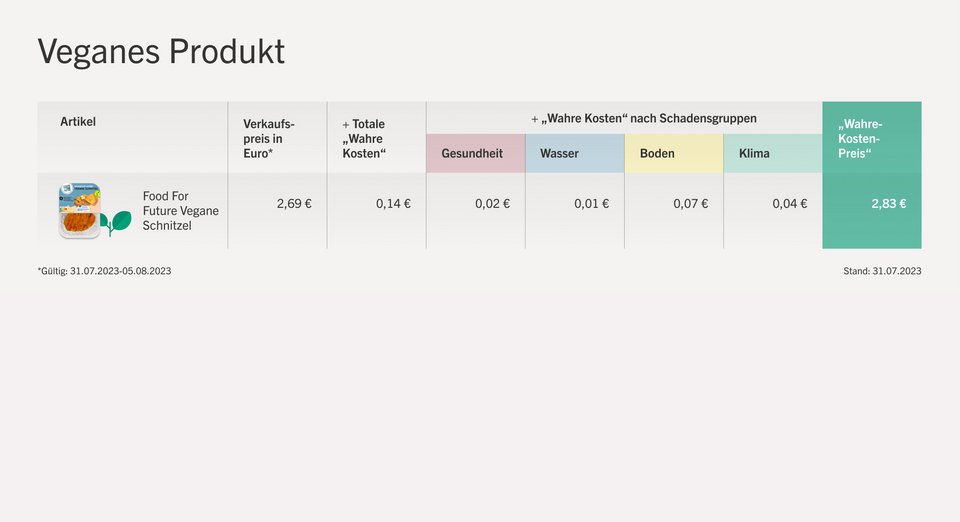
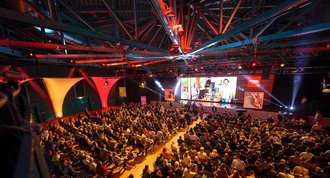
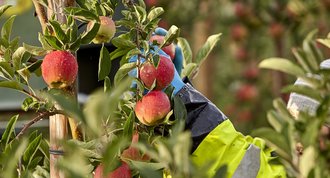

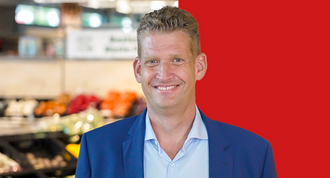
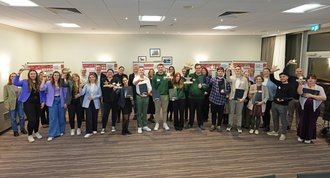


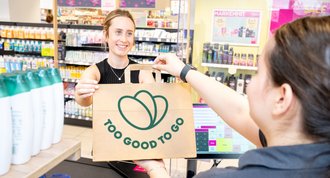

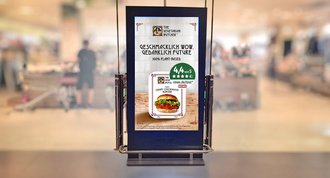
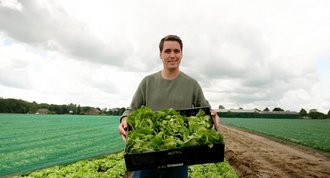

Both German and English comments appear here.
A great campaign. There would probably have been too much information on the shelf, but I would have really liked it if the plant-based alternative (unfortunately usually more expensive at the "normal price", but presumably cheaper in terms of the "true cost") had been pointed out - e.g. soya yoghurt in the case of organic yoghurt.
In this case, I think Penny's campaign(s) are fantastic! In this way, we are fulfilling our responsibility to reflect the effects of our consumers' purchasing behaviour in an exemplary manner. Unfortunately, this does not meet with widespread approval or understanding. This means that without politicians joining in, individual actions will unfortunately not be able to bring about major change. Nevertheless, I am proud precisely because of these ambitions and the courage of our group / company!